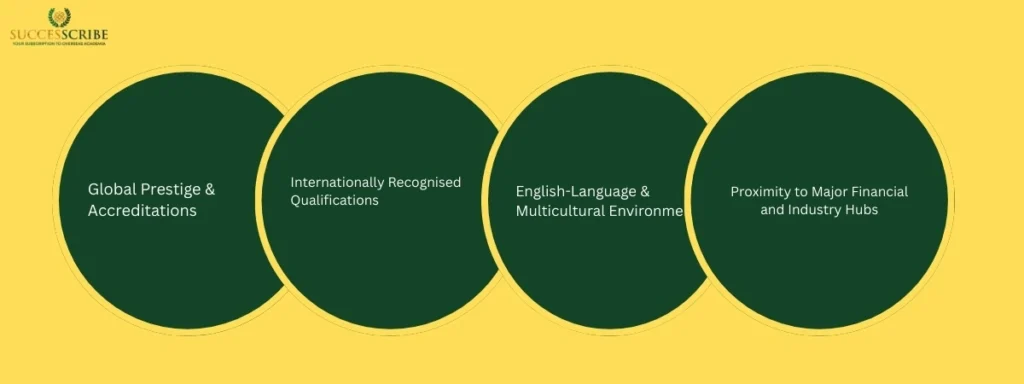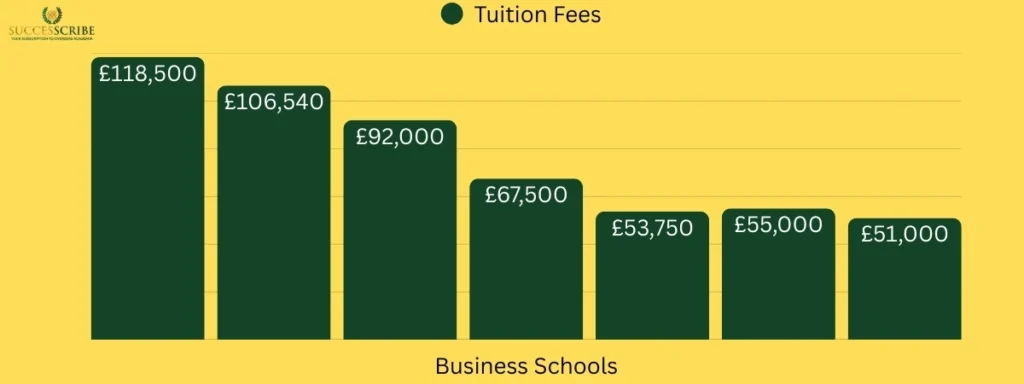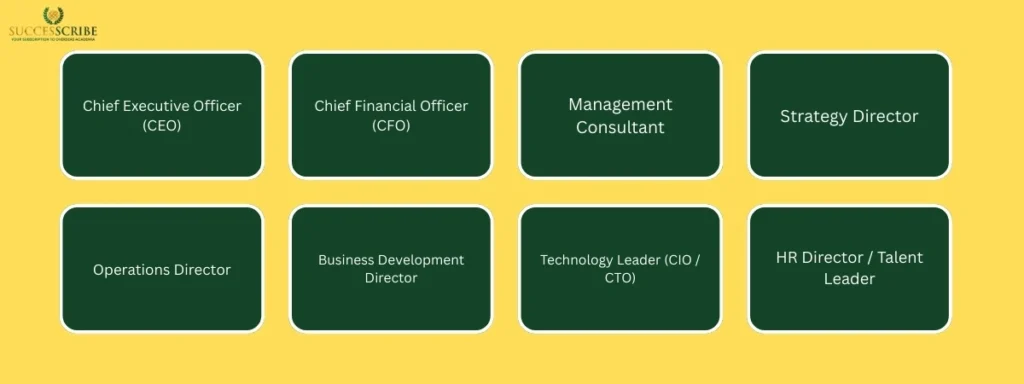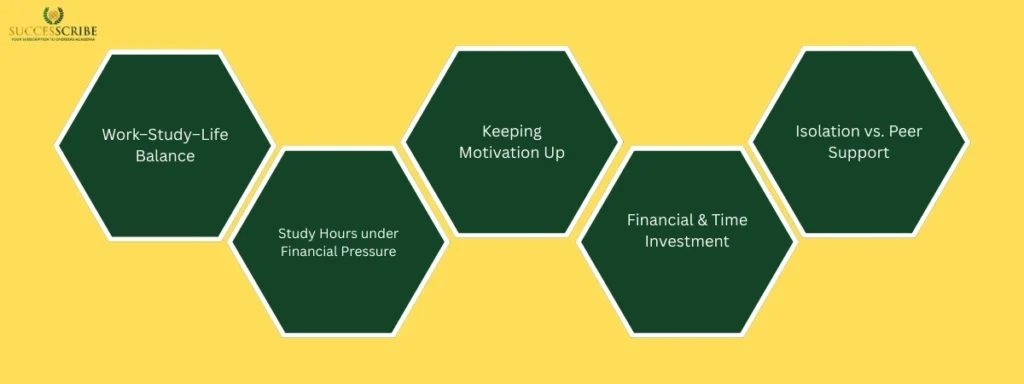An Executive Master of Business Administration (Executive MBA or EMBA) is a graduate-level business degree designed for mid- to senior-level professionals who possess substantial professional and managerial experience, typically between 5 and 15 or more years. Unlike the full-time MBA, which often draws recent college graduates or early-career professionals aiming to shift careers, the EMBA is focused on enhancing existing leaders’ strategic mindset, leadership capacities, and global business acumen, while allowing them to continue working full time. Choosing an Executive MBA in UK is not just about education, it’s about unlocking global leadership doors while keeping your career momentum intact.
Key Highlights: Executive MBA in UK
- Global Recognition – Over 20 UK business schools rank among the world’s top for Executive Education.
- Work Experience Required – 8–12 years of professional experience needed on average, including 3–5 years in managerial roles.
- Flexible Formats – Weekend, modular block, and blended delivery allow executives to study while working full-time.
- Tuition Fees – Range from £45,000 to £129,950 (approx. ₹41 lakh – ₹1.10 crore) depending on the institution.
- Leading Institutions – Oxford Saïd, London Business School, Cambridge Judge, Warwick, Imperial, and Bayes (City, University of London).
- Diverse Cohorts – 60–70% of students in top programs are international professionals.
- Career Outcomes – Graduates achieve 50–70% salary growth within 2–3 years; average post-EMBA salaries are £100,000–£150,000 annually.
- Senior Roles Secured – Typical positions include CEO, CFO, Strategy Director, Senior Consultant, and Technology Leader.
- Funding Opportunities – Scholarships up to 50% of tuition fees; 30–40% of students receive employer sponsorship.
- Global Exposure – Many programs include international study trips, global residencies, and partnerships with schools like Columbia Business School.
Top Reasons to Choose the UK for an EMBA?

When you pursue an Executive MBA in UK, you don’t just study; you step into a powerhouse of global networks, multicultural classrooms, and boardroom-level learning.
1. Global Prestige & Accreditations
British business schools are consistently ranked among the world’s top institutions. Many hold the triple accreditation, AACSB, AMBA, and EQUIS, a hallmark of global business education quality.
2. Internationally Recognised Qualifications
Graduates receive globally respected diplomas, with degree-awarding powers backed by UK’s Office for Students and Quality Assurance Agency (QAA). A UK EMBA on your résumé signals rigorous academic standards paired with real-world applicability.
3. English-Language & Multicultural Environment
The UK’s EMBA programs are delivered in English and attract a diverse cohort: professionals from Europe, Asia, Africa, the Americas. The multicultural exchange enriches both classroom learning and global networking.
4. Proximity to Major Financial and Industry Hubs
Many programs are delivered in, or near, London, Manchester, Oxford, Cambridge, regions with rich access to financial services, consulting, media, biotech, and start-ups.
Structure & Delivery in the UK
Executive MBA programmes across UK business schools are uniquely designed to accommodate ambassadors of leadership, professionals with significant career commitments. The beauty of an Executive MBA in UK lies in its flexible structure – from weekend modules at The Shard to global residencies, the format adapts to your leadership journey.
| Mode | Schedule & Format | Duration |
| Weekend-based | 1–2 full weekends per month | 18–24 months |
| Modular Block | 1 week intensive modules (e.g., once per 2–3 months) | 12–20 months |
| Blended/Online | Mix of online study + in-person residencies | 12–18 months |
- Typical credit requirement: 60–90 UK credits, aligned with 180 EU credits of standard master’s programs.
- Assessments: Mix of group case projects, capstone business strategy projects, examinations, presentations, and 360° leadership development feedback.
Entry Requirements & Eligibility
Unlike traditional MBAs, the Executive MBA in UK looks beyond grades – it values your leadership footprint, your career impact, and your vision for the future. The admission criteria focus more on work experience, leadership potential, and career achievements, rather than just academic records. Below is a detailed breakdown of what top UK universities generally require:
| Requirement | Details | Notes/Exceptions |
| Educational Qualification | A recognized bachelor’s degree (2:1 or equivalent) from a reputed institution. | Some universities accept candidates with lower degrees if they have significant leadership experience. |
| Work Experience | Minimum 5–10 years of full-time professional experience, with at least 3–5 years in a managerial or leadership role. | At Oxford, Cambridge, and LBS, the average work experience is 10–12 years. |
| GMAT / GRE | Not always mandatory for EMBA programs in the UK. Some schools (like London Business School) may ask for it if your academic background is weak. | Many top schools focus more on work profile than test scores. |
| English Language Proficiency | For international students: IELTS (7.0+), TOEFL (100+), or PTE (65+). | Waivers often given if you studied in English previously. |
| Employer Support / Sponsorship | Some universities ask for an endorsement letter from the employer showing support (time-off, funding, or recommendation). | At Oxford’s EMBA, employer support is strongly recommended but not mandatory. |
| References | Usually 2 professional references highlighting leadership potential and achievements. | Academic references may be accepted if you are in a teaching/research role. |
| Personal Statement / Essays | Applicants must write essays or statements of purpose showing career vision, leadership style, and reasons for choosing EMBA. | These essays are heavily weighted in admission. |
| Interview | A personal or virtual interview with the admissions panel to assess leadership qualities and program fit. | Most top EMBA programs in the UK require this. |
Typical Profile of EMBA Students in the UK
| Factors | Average Profile in Top UK Schools |
| Age Range | 32–45 years |
| Average Work Experience | 10–15 years |
| Managerial/Leadership Experience | 5–7 years |
| Industry Background | Finance, Consulting, IT, Healthcare, Manufacturing, Public Policy |
| Nationality Mix | 60–70% international students in top schools like LBS & Oxford |
Top Executive MBA Programs in the UK
Here’s a table with some prominent UK EMBA offerings.
| Business School (Location) | Duration | Format & Delivery Highlights | Tuition (GBP) |
| Oxford Saïd (Oxford) | 22–24 months | Modular: Week-long in-person modules in Oxford, with some international sessions; start in Sept 2025 or Jan 2026 | £124,920 (includes tuition, reading materials, meals, university/college services) |
| London Business School (London & Dubai) | 17–22 months (typical: 20 months) | Flexible formats: In-person or blended; options in London and/or Dubai; global tracks include LBS & Columbia partnerships | London: £129,950; Dubai: US$155,500 (excluding VAT) |
| Cambridge Judge (Cambridge & Global) | 20 months | Regular in-person weekend and block modules; Global EMBA includes international study trips and blended elements | UK EMBA: £98,100; Global EMBA: £102,235 |
| Warwick Business School (London) | 24 months (approx.) | Part-time, weekdays: Weekend or evening formats; delivered at The Shard in London; strong leadership focus | £67,860 |
| Bayes Business School (City, London) | 24 months (approx.) | Evening or monthly weekend formats; includes ‘International Consultancy Week’ and core modules with immersive weeks | £55,700 |
Why These Programs Stand Out
Oxford Saïd Executive MBA
- Consistently ranked #1 globally in the QS Executive MBA rankings
- Modular delivery allows working professionals to attend intensive week-long sessions while staying in their roles.
- Includes a compulsory overseas module and optional electives for global exposure
London Business School EMBA
- Exceptionally flexible with in-person and blended formats across London and Dubai, plus global routes (e.g., EMBA-Global with Columbia)
- Curriculum mirrors full-time MBA with core courses, electives, and a strategic capstone project
Cambridge Judge EMBA
- Compact 20-month program, with both traditional and Global variants, Global EMBAs include international trips and blended learning options.
- Payment plans and scholarships make it financially flexible for applicants.
Warwick Business School (London) EMBA
- Delivered from central London (The Shard), with weekend or evening schedules for convenience
- Highly rated (4th in UK FT ranking) and tailored for senior-level professionals.
Bayes Business School EMBA
- One of the more affordable options, with immersive modules and consultancy projects embedded into delivery.
- Great for professionals seeking applied, project-based learning in a modular format.
Tuition Fees & Financial Considerations for EMBA in the UK

Pursuing an Executive MBA in UK is a significant investment, both financially and professionally. The costs vary widely depending on the university, program duration, and mode of study. On average, tuition fees for a top EMBA program in the UK range between £45,000 and £120,000 (approximately ₹41 – 1.10 crore INR) for the entire course.
Tuition Fees at Leading UK Business Schools
| Business School | EMBA Program | Tuition Fees | Duration | Notes |
| London Business School (LBS) | Executive | £118,500 | 20 months | Global ranking in FT Top 10 |
| University of Oxford – Saïd Business School | Oxford Executive MBA | £106,540 | 24 months | Modular format (1 week per month) |
| University of Cambridge – Judge Business School | Cambridge Executive MBA | £92,000 | 20 months | Blended with international consulting projects |
| Imperial College Business School | Executive MBA | £67,500 | 23 months | Weekend & flexible online modules |
| Warwick Business School (WBS) | Executive MBA | £53,750 | 2 years | Options: London or Warwick campus |
| Bayes Business School (City, University of London) | Executive MBA | £55,000 | 24 months | Evening & weekend classes |
| Manchester Alliance Business School | Global Part-time MBA (EMBA equivalent) | £51,000 | 24 months | Global residencies included |
Additional Costs to Consider
Apart from tuition fees, EMBA students should budget for living and other academic costs:
| Expense Category | Average Annual Cost (London) | Average Annual Cost (Outside London) |
| Accommodation (rent) | £15,000 – £20,000 | £10,000 – £14,000 |
| Food & groceries | £3,000 – £5,000 | £2,500 – £4,000 |
| Travel & transport | £2,000 – £3,500 | £1,200 – £2,000 |
| Books, case studies, materials | £1,000 – £2,000 | £1,000 – £1,500 |
| International study trips | £3,000 – £6,000 | £3,000 – £6,000 |
| Miscellaneous (insurance, personal) | £2,000 – £4,000 | £1,500 – £3,000 |
Funding & Scholarships
Many professionals self-fund their EMBA, but scholarships and employer sponsorships are becoming more common.
- Employer Sponsorship – Around 30–40% of EMBA students receive partial or full sponsorship.
- Scholarships & Bursaries –
- LBS: EMBA Scholarships for Women in Leadership (up to £30,000).
- Oxford Saïd: Executive MBA Scholarships (up to 50% tuition fee).
- Cambridge Judge: Dean’s Scholarships (merit-based, partial funding).
- Loans – Prodigy Finance, Future Finance, and UK government-backed postgraduate loans (for eligible residents).
Return on Investment (ROI)
While the upfront cost is high, the ROI of an EMBA in the UK is significant.
- Average Salary Post-EMBA in the UK: £100,000 – £150,000 annually.
- FT Rankings show that EMBA graduates experience a salary increase of 60–80% within 3 years of completion.
- Senior roles post-EMBA include: Chief Executive Officer, Chief Financial Officer, Senior Consultant, Partner (Consulting), and Director roles.
Curriculum Focus & Specializations in UK Executive MBA Programs
The Executive MBA in UK is designed to combine rigorous academic learning with practical business insights, allowing professionals to directly apply classroom knowledge to workplace challenges. Unlike a traditional MBA, EMBA programs are tailored for experienced executives and senior managers, with an emphasis on leadership, strategic thinking, and global business management.
Core Curriculum – What you’ll study everywhere (by school)
| School | Core/Required Areas called out publicly |
| Oxford Saïd – Executive MBA | Analytics; Leadership Fundamentals; Governance & Ethics; Firms & Markets; Strategy; Accounting; Technology & Operations; Business Finance; Marketing. Entrepreneurship Project integrates learning. |
| London Business School – EMBA | Access to the same core courses as LBS degree portfolio (delivered across London/Dubai) before electives and Global Experiences; details live on programme content pages (cores + leadership & coaching). |
| Cambridge Judge – EMBA / Global EMBA | EMBA combines rigorous core courses (strategy, finance, leadership, data, etc.) taught across weekend/block formats; course list sits under “Core courses & electives.” |
| Imperial College Business School – Executive MBA | Carefully curated core modules for senior general management + Executive Leadership Journey; international residencies embedded in the core. |
| Warwick Business School – Executive MBA | Eight required modules build the management fundamentals, followed by electives (including an international elective). |
| Bayes (City) – Executive MBA | Core delivered via modular or evening formats, followed by a set of elective modules and a Business Integration/Consultancy project. |
Elective Themes / Specializations
| School | Examples of published EMBA electives / themes |
| Oxford Saïd (EMBA) | AI for Executives; Corporate Turnaround & Business Transformation; Corporate Valuation; Entrepreneurial Finance (international); Fintech & AI in Finance; Innovation Strategy; M&A; Evidence-based Inclusive Leadership; Identification (Causation vs Correlation); Inclusive Innovation in Africa (international); GOTO (Global Opportunities & Threats: Oxford). |
| London Business School (EMBA) | Choose 6–9 electives from 100+ across Accounting; Economics; Finance; Management Science & Operations; Marketing; Organisational Behaviour; Strategy & Entrepreneurship; formats include weekday/evening/weekend/block weeks in London & Dubai. Entrepreneurship Summer School and a Business Project are available. |
| Cambridge Judge (EMBA) | Advanced Corporate Finance; Managing Big Data Analysis; Design Thinking & Innovation; Strategy in Ecosystems; Geopolitics & Business Decisions; Circular Economy; Sustainable Finance (incl. biodiversity); The Effective Director; Leadership & the EDI Debate; Philosophy of Business; Universal Ownership, Divestment & Greenwashing; Entrepreneurship: Art or Science? |
| Imperial (Executive MBA) | Core plus IB Glocal Electives and international residencies (modules at partner schools worldwide); final individual strategic project. Specific elective menus vary by year and are shared across the MBA portfolio. |
| Warwick (Executive MBA) | Structure specifies three electives plus one international elective; menus rotate across themes such as strategy, entrepreneurship, innovation, finance, healthcare, sustainability (exact titles set per year). |
| Bayes (City) – Executive MBA | Published examples include Advanced Analytics for Business; Leading Strategy Execution (with further rotating electives); programme features International Consultancy/Integration projects in Year 2. |
Career Prospects After an Executive MBA in UK

An Executive MBA (EMBA) in the UK opens up senior leadership, consulting, and strategic management opportunities across industries. Employers in finance, consulting, technology, and healthcare actively seek EMBA graduates due to their leadership maturity and business acumen.
Graduates from top UK institutions like London Business School, Oxford Saïd, and Cambridge Judge report an average salary increase of 55–65% within 3 years of graduation.
Average Salary After EMBA in the UK
| Parameter | Details |
| Average Post-EMBA Salary (UK) | £90,000 – £120,000 annually |
| Top 25% Earners | £140,000 – £180,000 annually |
| Global Average | £120,000 after 3 years |
| Pre-EMBA Salary (UK Average) | £55,000 – £70,000 annually |
| Salary Growth | 55–65% within 3 years of graduation |
Popular Job Roles After EMBA in the UK
| Job Role | Average Annual Salary (UK) |
| Chief Executive Officer (CEO) | £150,000 – £200,000+ |
| Chief Financial Officer (CFO) | £120,000 – £160,000 |
| Management Consultant | £90,000 – £140,000 |
| Strategy Director | £100,000 – £150,000 |
| Operations Director | £90,000 – £130,000 |
| Business Development Director | £85,000 – £125,000 |
| Technology Leader (CIO / CTO) | £110,000 – £160,000 |
| HR Director / Talent Leader | £80,000 – £120,000 |
Challenges & Considerations for EMBA Aspirants

Balancing an EMBA with professional and personal life is undeniably demanding. Yet, with forethought and support, participants thrive.
| Challenge | What Make it Tough | Solutions |
| Work–Study–Life Balance | Managing career, assignments, and personal commitments at once. | Set a consistent weekly study schedule. Delegate tasks when possible. Involve family/friends for support. |
| Study Hours under Financial Pressure | Rising living costs may cut into academic time – UK students now average 11.6 independent study hours/week. | Prioritize rest and quality study. Leverage school’s hardship funds or coaching support for stress points. |
| Keeping Motivation Up | Fatigue and overwhelm are real across intensive programs. | Executive coaching embedded in EMBA programs helps maintain focus. Over 87% of EMBA programs now offer it. |
| Financial & Time Investment | EMBA programs are costly, and long durations can strain finances or planning. | Budget realistically, explore early scholarship rounds, and secure employer sponsorship early. |
| Isolation vs. Peer Support | Staying motivated can be tricky without cohort support. | Connect with peers via alumni groups or join coaching groups for accountability and interaction. |
Conclusion
Every year, more than 5,000 executives choose the UK for one reason, an Executive MBA in UK changes lives. Ranked among the top 3 executive education hubs in the world, the UK is home to over 20 globally recognized business schools that attract leaders from 100+ countries. The results speak for themselves: graduates report a 50–70% salary jump within just 2–3 years, with many crossing the £120,000 annual mark. But it’s not only about money, over 80% of UK EMBA graduates secure senior leadership roles, boardroom positions, or successfully launch their own ventures.
FAQs
What is the difference between an MBA and an Executive MBA in UK?
An MBA is designed for early to mid-career professionals, while an Executive MBA in UK is tailored for experienced managers, executives, and entrepreneurs. The EMBA allows students to study part-time while continuing to work, making it more flexible and career-oriented.
How much work experience is required for an Executive MBA in UK?
Most top UK business schools require 8–12 years of professional experience, with at least 3–5 years in a managerial role. However, some schools may accept applicants with slightly less experience if they demonstrate exceptional leadership potential.
What is the cost of an Executive MBA in UK?
The average tuition fee ranges between £40,000 – £100,000, depending on the university and program structure. Top schools like London Business School or Oxford Saïd are on the higher end but offer unmatched global exposure and networking.
Do I need to quit my job to pursue an EMBA in UK?
No. One of the biggest advantages of an Executive MBA in UK is its flexibility. Most programs are part-time, modular, or weekend-based, allowing you to balance work, study, and personal life.
What is the average salary after completing an Executive MBA in UK?
Graduates often experience a 50–70% salary increase within 2–3 years. Many move into senior leadership positions with salaries exceeding £120,000 per year.
Related Post
Best MBA colleges in UK for Indian student
MBA in UK without work Experience
One year MBA in UK
Sample LOR for study abroad program















